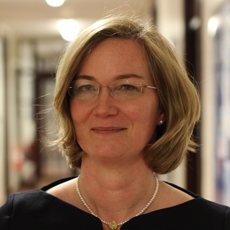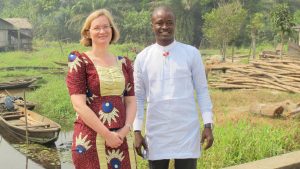
[mixcloud https://www.mixcloud.com/EdusoundsNg/destination-brazil-arrival-nigeria-an-interview-with-dr-insa-nolte/ width=100% height=120 hide_cover=1 light=1][/mixcloud]
Dr Insa Nolte had her first degree from the Freie Universität Berlin, Germany, after which she joined the Centre of West African Studies (now DASA) at the University of Birmingham as a PhD student to work on the history and politics of Remo under the supervision of Professors Paulo de Moraes Farias and Karin Barber. On completion of her PhD programme, she held the Kirk-Greene Junior Research Fellowship at St Antony’s College, Oxford, and then returned to DASA on completion of her fellowship at the University of Oxford to take up a lectureship in 2001 in DASA and was promoted to the position of a Reader in 2015.
In 2012, she joined the Department of History and International Studies at Osun State University, Nigeria, as a Visiting Professor. She is currently the Vice Chair of the UK Council of Area Studies Associations (UKCASA), where she represents African studies. She is the President of the African Studies Association of the UK (ASAUK), which represents all Africanists in the UK. She is an inaugural member of the Editorial Advisory Board (EAB) of Africa: The Journal of the International African Institute, and served as the journal’s reviews editor from 2012 to 2017.

The privatisation of information has also had a crippling effect on historical research. While many important files of the colonial period are held outside Africa, those that are based on the continent tend to decline over time, and not only because of often dismal storage conditions. In various Nigerian archives we have consulted, files relating to land, political authority and identity had disappeared or were missing sections. Where files exist, personal experience suggests that it is not unusual for researchers to be put under considerable pressure not to investigate issues that might be seen as challenging the interests of powerful individuals. At the same time, archival resources on the postcolonial period are extremely limited because politicians routinely take home the most important files from their tenure to ensure security.
– Olukoya Ogen & Insa Nolte (PDF)
[mixcloud https://www.mixcloud.com/EdusoundsNg/destination-brazil-arrival-nigeria-an-interview-with-dr-insa-nolte/ width=100% height=120 hide_cover=1 light=1][/mixcloud]
Her research focuses on the importance of private and everyday life for wider social relations and political processes in the Yoruba-speaking Southwest of Nigeria. Her current work centres on the everyday lives of Yoruba Muslims, Christians and traditionalists, and it explores the way in which religious differences and encounters inform social identities, shaped by gender, generation, and education etc. For more information, see project website and blog and/or follow on Facebook and Twitter @KEONigeria.
in a review by Dmitri Van Den Bersselaar of Dr Insa Nolte’s book: Obafemi Awolowo and the Making of Remo. The Local Politics of a Nigerian Nationalist , the Late Chief Obafemi Awolowo’s political ideology was eloquently described:
Obafemi Awolowo (1909-87) is best known for his role in Nigerian national politics. Author of the influential book Path to Nigerian Freedom (1947), founder of the Action Group (AG) political party, first premier of the Western Region, and a credible – if ultimately unsuccessful – candidate for the Nigerian presidency on several occasions until his retirement from politics in 1983, Awolowo was a towering presence in national politics close to four decades. As one of the leading Nigerian nationalists, alongside his political rivals Nnamdi Azikiwe and Amadu Bello, Awolowo would be a worth subject for a new political biography. Insa Nolte’s new book offers something different: while it does also offer an insightful analysis of Awolowo’s political ideology and national political activities, it primarily discusses his role in the local politics of his native Remo (in southwest Nigeria, close to Lagos) and his support of grassroots political mobilisation, as well as the extent to which Awolowo himself was shaped by the specific forms of joint decision-making and popular participation that had historically emerged in Remo.
…the ideology and political actions of Awolowo are analysed, and in particular how he used party politics to overcome Remo’s factionalism. The analysis emphasises the importance of Remo’s history of participation and consenr in local politics, its grassroots associations, and popular mobilisation. Therefore, while from the 1940s onwards Remo politics became centred on Awolowo’s agency and leadership, his success depended on popular consent and the community’s view of itself. During Awolowo’s later years, the importance of the local community in his political ideology only grew. Disillusioned with the Nigerian state, he increasingly emphasised the need for self-reliance and civic duty, and supported the growth of Remo’s development associations that attempted to improve the region through self-help and communal solidarity.
– Dmitri Van Den Bersselaar
Her first book, entitled Obafemi Awolowo and the Making of Remo: The local politics of a Nigerian Nationalist, examines power and consent in the history of a distinctive region of Southwest Nigeria, which produced Nigeria’s most important Yoruba politician. She is the lead editor (with Olukoya Ogen and Rebecca Jones) of Beyond Religious Tolerance: Muslims, Christians and Traditionalists in an African Town (2017, James Currey/ Boydell and Brewer) (PDF) and you can order it here (PDF).
In this conversation, we discuss many issues, amongst which are:
- How her ambition to go on a students exchange programme to Brazil ended up in Lagos, Nigeria
- How she became interested in researching on Ode Remo in Ogun state, Southwest Nigeria
- The significance of Ode Remo politics in forming and shaping the political identity of one of Nigeria’s founding fathers, Late Chief Obafemi Awolowo
- The challenges of conducting academic research in Nigeria
Enjoy!
[mixcloud https://www.mixcloud.com/EdusoundsNg/destination-brazil-arrival-nigeria-an-interview-with-dr-insa-nolte/ width=100% height=120 hide_cover=1 light=1][/mixcloud]
Please, leave your thoughts on this post in the comment section and feel free to share the article/podcast with your contacts. Thanks for taking out of your precious time to read/listen to my article/podcast!
If you like this post, kindly subscribe and/or follow me on Twitter @otukogbe and @EdusoundsNg or on Facebook at edusoundsng.
No river flows with its source. The problems we are experiencing in Nigeria did not just start now. Imagine! Nigeria history well documented in the precolonial era but same can’t be said of post colonial era! If we want to be among the leaders of the world we need to relate our own story in our own way and not to leave it for an outsider!
Nigerians wise up!